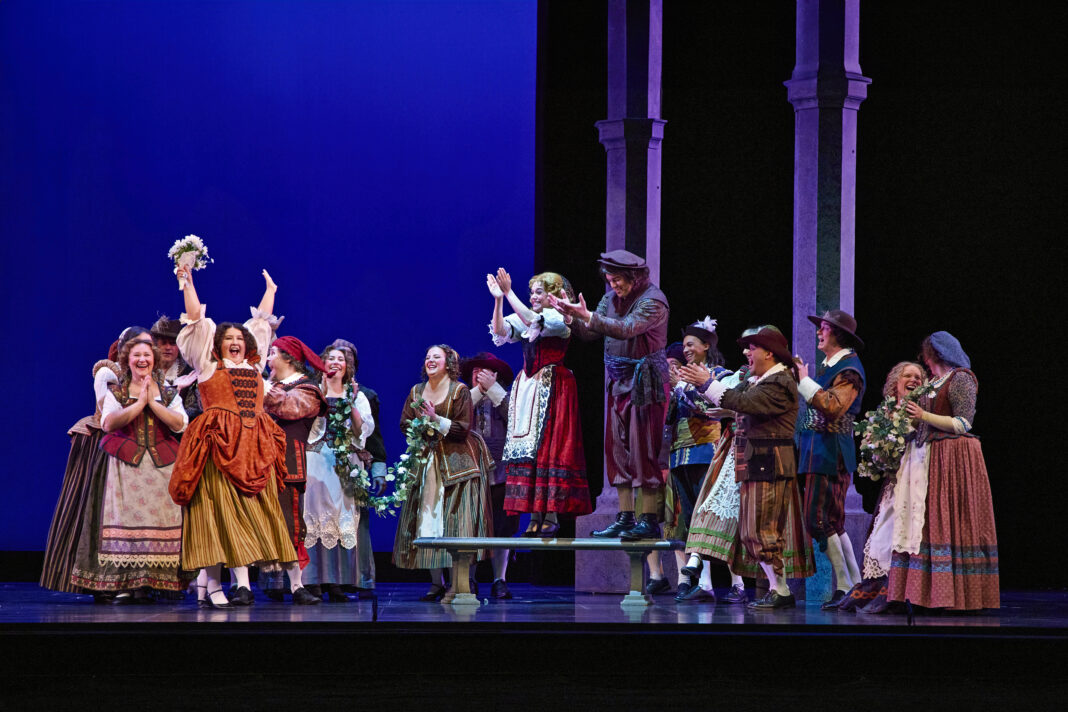It’s expensive, outdated, and dull. Watching a bunch of people in powdered wigs sing in foreign languages at insanely high pitches for hours… where’s the fun in that?
Actually, there’s a lot of fun in it. There’s also a lot more to opera than what meets the initial thought.
This initial thought process is a common misconception in most people, myself included. Despite knowing a lot about classical music history, participating in musical theatre, drama, and playing as a solo violinist in an orchestra, I had no intention of ever purchasing a ticket to an opera. Quite honestly I was aware of and somewhat interested in opera, just not interested enough to go.
Recently however, the Calgary Opera offered me the opportunity to attend an opera dress rehearsal as a youth blogger. They also gave me the opportunity to interview the stage director of the opera I was watching, Ms. Anna Theodosakis. Despite knowing very little about opera, I was thrilled. It’s not every day that you get to talk to someone who directs an opera, and it’s certainly not every day that you get to attend an opera as a youth.
So I did my research, conducted the interview, watched the opera, and learned a TON. To tell you everything would require at least five different posts, so I’ll give you a hyper-condensed version of what I did learn.
But Opera is Boring… Right?
Again, we know that all operas are written in foreign languages by old white European men in curly powdered wigs and frilly collars from the 1700s. It’s not relevant, so why would you even bother going to see one unless you’re pretending you’re high and mighty and better than everyone else?
Actually, that’s a loaded statement. Loaded with a lot of misconceptions that many people (including myself) unfairly hold against the art.
Even if you’re not a performing art geek like I am, there’s still so much to enjoy about opera. It’s essentially a fired up live action movie with twice as much drama: a live play with subtitles, live music, and lighting to match the scenes. It’s quite fascinating.
Don’t believe me? Read on.
Unless You’re an Alien, the Human Condition is Relevant
Most of us had a massive crush on someone before. Or turned green with envy when we see those rolling in wealth and power. We’ve all felt or seen someone grieve.
These experiences are what we call the human condition. We can define the human condition as the set of universal experiences, emotions, and thoughts that mostly everyone will experience. Regardless of time period, gender identification, and race, we’ve all experienced these things.
That’s what makes us human.
And that is also what makes both contemporary and classical opera relevant to us today.
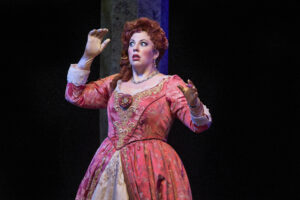
Although there are contemporary operas set in modern times (that’s a whole other rabbit hole that there isn’t time to dive into), classical operas are very much still relevant to audiences today. When I asked Ms. Anna Theodosakis about the relevance of classical opera today, she told me about the adaptability of opera and how it conveyed its main message.
Ms. Theodosakis told me about operas being altered a little bit for audiences in many different settings while maintaining their main message. She talked about how she highlighted the feminism in Don Giovanni, which obviously was a smaller theme in Mozart’s time. But the versatility of such a multifacted art still astonished me.
“It’s a little like Shakespeare, but a bit easier to digest. These stories and their impact is the reason these stories have been relevant and easy to adapt. I love seeing [how] these pieces evolve in different settings and having the music support that as well. For example, to see how the story would change if it took place in a war setting or a modern setting or in its original historic setting.”
“Opera is so versatile, and yet its core messages remain consistent, and that’s something I really love about it.”
We Really are Different.
Something that I’ve found to be unique to opera is the ability to hear the characters’ thoughts. Unless you watch Shakespeare monologues recreationally, there aren’t many other times where you get to hear thought processes. Even in movies and books, a lot of the thoughts are hidden in the context and social cues.
Although there’s still very much body language in opera (dancing is a big thing), the motivations and beliefs that each character holds is literally projected into the audience as performers sing them out loud. Each complex thought, each conflicted feeling – they’re not just left up to interpretation. The storyline is clear as day. The expression holds together the entire character, and a little piece of the performer as well.
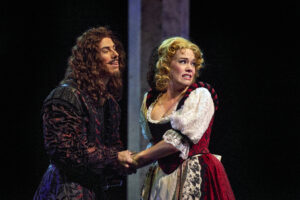
When I talked about this with Ms. Theodosakis, she told me:
“Opera offers a release from the modern world. Nothing is quite as visceral as seeing an opera singer in person… that’s a really special experience because a performer will never give the same performance twice.”
It’s true. I really can’t describe anything even comparably as visceral. Personally, this helped me as an audience member to truly empathize with every character onstage… even the ones I wasn’t really supposed to empathize with.
(*cough cough* the super evil villain *cough cough*)
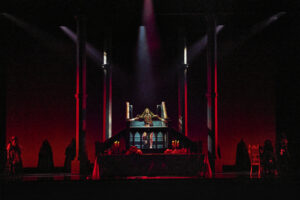
And since every little bit of the opera was linked to the human condition, I was also able to link some of these characters’ experiences to my own and to those around me. Hearing others’ thoughts, so different from my own personal narrative but still quite understandable, was jarring.
I felt as if watching the opera was a little bit of an out-of-body experience. My mind bounced from character to character. I sympathized with everyone so deeply that one minute I was laughing, the next I was sobbing, and then all of a sudden my jaw would literally and uncontrollably drop.
Outside from the characters, it really hit me how differently everyone around me was thinking. I feel like I can understand people in my own life a little better now, or at least I’m willing to try. I was blown away by the stark reminder of how we all hold our own beliefs and values to be undeniably true. How technically nobody can really be seen as “wrong”.
On a surface level, I suppose I knew all of this already. We’re all different, nobody is bad, yadda yadda yadda. But experiencing it is something else.
Everyone really is incredibly different, and strangely enough while we all contradict each other we are all still valid.
Isn’t that wild?
A Synthesis of the Arts
Opera is quite difficult to describe in words because of its complexity. It is essentially an intricately woven web of performing arts. There are elements of musical theatre, orchestral and chamber music, drama, storytelling, and dance.
Each of those elements has its own subcategories behind the scenes (i.e. costuming, lighting, staging, choreography). When all of these elements come together in a cohesive and artistic manner, we begin to see how expressive the true art of opera really is.
Singing… In 3D?
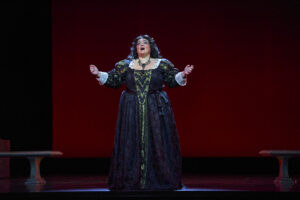
“In musical theatre, they say that if something isn’t important, they’ll talk. If it’s important, they’ll sing. And if it’s really important, they’ll dance. I find that this is also very relevant to opera; opera so expressive and impactful.”
When Ms. Theodosakis said that to me, my mind was a little blown. I’d always thought of self expression as a single dimension – you could express yourself though dance, or music, or poetry, or acting. Like I said, I used to do theatre. I play first violin in orchestra. I’ve always known about the individual forms of self expression.
I just never realized that doing all of them at once was possible. Or realized how powerful the combination was.
I quickly realized that opera is actually the summation of hundreds of peoples’ artistic interpretations of the main story being told. When I asked Ms. Theodosakis about how she discovered her love for opera, she talked about how the combination of arts really spoke to her.
“I think the main thing [I really loved] was the cross-connection of the genres. I grew up in the choir and as a dancer, and I also really liked to learn languages. This came together really well in opera. I now choreograph opera and dance.”
This really just means that we are able to truly see how expressive the combined mediums of performing arts are. As a cohesive mosaic of performance, the performers and the directors can approach self and character expression in a multifaceted way.
The Show Must Go On
Something I know personally from my experience in drama and in violin is that regardless of what happens onstage, the mark of a good performer is a good recovery.
That’s amplified by tenfold in opera.
Opera involves so many different art forms, which allows it to be so beautiful. Every aspect is linked to and reliant on another.
However, this also makes it incredibly easy for something to go wrong. This is when we get to see a lot of creative interpretation and improv. It’s my personal favorite part of theatre, because of how chaotic it can be. It displays the flexibility and teamwork of both performers and all behind the stage.
I really enjoyed this aspect of seeing a dress rehearsal opera, because I still got the opportunity to see how the performers would react when something didn’t go to plan. Not that I could tell off the bat. The fun of it is that the performers were so professional about it that it took me whole night to realize that a moment wasn’t intentional.
Figuratively, I also feel like the saying “the show must go on” is very relevant in our everyday lives. There are always unsavory things, unexpected events, and unfortunate experiences that we will all run into. Seeing how the performers can adapt so quickly and so flawlessly to small errors and technical difficulties feels a bit symbolic.
We must always get back up and continue smiling. The sun will continue to rise. Life goes on. The show goes on.
TL;DR
You should watch an opera.
All Production Photos used with permission from the Calgary Opera.

